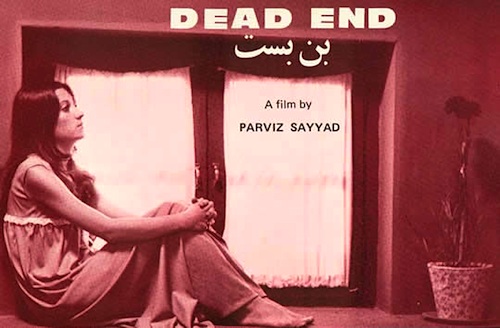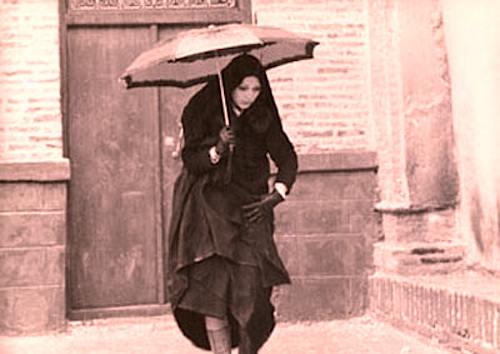 By Joe Bendel. It sounds creepy, but it was not uncommon practice for Iranian men to follow prospective wives as part of their due diligence. The men were supposed to be cautious and the women were supposed to be grateful. One revolution later, certain things remain the same, if not more so. As a result, one young woman jumps to conclusions when she recognizes a distinguished looking man haunting her street in Parviz Sayyad’s Dead End, which screens during the Asia Society’s Iranian New Wave 1960’s-1970’s film retrospective.
By Joe Bendel. It sounds creepy, but it was not uncommon practice for Iranian men to follow prospective wives as part of their due diligence. The men were supposed to be cautious and the women were supposed to be grateful. One revolution later, certain things remain the same, if not more so. As a result, one young woman jumps to conclusions when she recognizes a distinguished looking man haunting her street in Parviz Sayyad’s Dead End, which screens during the Asia Society’s Iranian New Wave 1960’s-1970’s film retrospective.
Pretty but hopelessly naïve, the young woman living with her widowed mother has strangely not received much attention from marriageable men. Initially, she is somewhat confused when she notices the tall mystery man loitering outside their flat. Since they live on the titular dead end street, there is not much to bring him to their neighborhood. Assuming he has honorable intentions, she quickly starts fantasizing about their potential union. However, Sayyad constantly slips viewers hints the unmarried woman’s hopes will not be consummated.
Considered a not-so veiled critique of the Shah’s rule, Dead End remains banned by the Islamist regime. It is not hard to see why, given its overt themes of surveillance. There is also a rather biting subtext regarding gender inequalities that is even more subversive under the Revolutionary government.

There is indeed plenty of open anger in Dead End, but it never sacrifices the highly personal drama for the sake of polemics. This is first and foremost the woman’s story, as painful and demoralizing as we expect it will be. Mary Apik’s lead performance is exquisitely sensitive, conveying a lifetime of disappointments and the acute vulnerability of her circumstances. It is a necessarily restrained performance, but it is hard to shake its quiet power. In contrast, Parviz Bahador projects an apt air of danger, yet is also quite charismatic in a coolly severe sort of way as the man following her.
While Jamsheed Akrami’s Lost Cinema provides some useful cultural context to fully appreciate Dead End, patrons should also bear in mind it gives away the emotionally devastating final twist. Still, many scenes take on additional significance when viewers know what fate ultimately holds in store for the woman. Regardless, both films are fitting selections for the Asia Society’s Iranian New Wave film series. In fact, Dead End is arguably a classic of world cinema that unquestionably ought to be more widely seen. Highly recommended, it screens this Saturday (11/9) with Sayyad and Akrami scheduled to participate in a Q&A session afterwards.
LFM GRADE: A
Posted on November 5th, 2013 at 11:11pm.